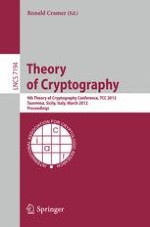2012 | OriginalPaper | Buchkapitel
On Efficient Zero-Knowledge PCPs
verfasst von : Yuval Ishai, Mohammad Mahmoody, Amit Sahai
Erschienen in: Theory of Cryptography
Verlag: Springer Berlin Heidelberg
Aktivieren Sie unsere intelligente Suche, um passende Fachinhalte oder Patente zu finden.
Wählen Sie Textabschnitte aus um mit Künstlicher Intelligenz passenden Patente zu finden. powered by
Markieren Sie Textabschnitte, um KI-gestützt weitere passende Inhalte zu finden. powered by
We revisit the question of
Zero-Knowledge PCPs
, studied by Kilian, Petrank, and Tardos (STOC ’97). A ZK-PCP is defined similarly to a standard PCP, except that the view of any (possibly malicious) verifier can be efficiently simulated up to a small statistical distance. Kilian et al.obtained a ZK-PCP for
NEXP
in which the proof oracle is in
EXP
NP
. They also obtained a ZK-PCP for
NP
in which the proof oracle is computable in polynomial-time, but this ZK-PCP is only zero-knowledge against
bounded-query
verifiers who make at most an
a priori fixed
polynomial number of queries. The existence of ZK-PCPs for
NP
with efficient oracles and arbitrary polynomial-time malicious verifiers was left open. This question is motivated by the recent line of work on cryptography using tamper-proof hardware tokens: an efficient ZK-PCP (for any language) is
equivalent
to a statistical zero-knowledge proof using only a single stateless token sent to the verifier.
We obtain the following results regarding efficient ZK-PCPs:
Negative Result on Efficient ZK-PCPs.
Assuming that the polynomial time hierarchy does not collapse, we settle the above question in the negative for ZK-PCPs in which the verifier is
nonadaptive
(i.e. the queries only depend on the input and secret randomness but not on the PCP answers).
Simplifying Bounded-Query ZK-PCPs.
The bounded-query zero-knowledge PCP of Kilian et al. starts from a
weakly-sound
bounded-query ZK-PCP of Dwork et al. (CRYPTO ’92) and amplifies its soundness by introducing and constructing a new primitive called
locking scheme
— an unconditional oracle-based analogue of a commitment scheme. We simplify the ZK-PCP of Kilian et al. by presenting an elementary new construction of locking schemes. Our locking scheme is purely combinatorial.
Black-Box Sublinear ZK Arguments via ZK-PCPs.
Kilian used PCPs to construct sublinear-communication zero-knowledge arguments for
NP
which make a
non-black-box
use of collision-resistant hash functions (STOC ’92). We show that ZK-PCPs can be used to get black-box variants of this result with improved round complexity, as well as an
unconditional
zero-knowledge variant of Micali’s non-interactive CS Proofs (FOCS ’94) in the Random Oracle Model.
